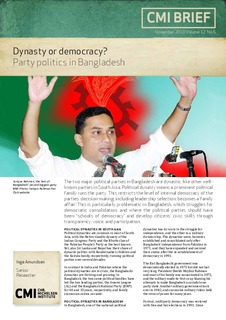| dc.contributor.author | Amundsen, Inge | |
| dc.date.accessioned | 2018-01-04T08:18:12Z | |
| dc.date.available | 2018-01-04T08:18:12Z | |
| dc.date.issued | 2013-11-29 | |
| dc.identifier | oai:www.cmi.no:4974 | |
| dc.identifier.citation | Bergen: Chr. Michelsen Institute (CMI Brief vol. 12 no. 6) 4 p. | |
| dc.identifier.issn | 0809-6732 | |
| dc.identifier.uri | http://hdl.handle.net/11250/2474844 | |
| dc.description.abstract | The two major political parties in Bangladesh are dynastic, like other well-known parties in South Asia. Political dynasty means a prominent political family runs the party. This restricts the level of internal democracy of the parties: decision-making, including leadership selection, becomes a ‘family affair’. This is particularly problematic in Bangladesh, which struggles for democratic consolidation, and where the political parties should have been “schools of democracy” and develop citizens’ civic skills through transparency, voice, and participation. | |
| dc.language.iso | eng | |
| dc.publisher | Chr. Michelsen Institute | |
| dc.relation | CMI Brief | |
| dc.relation | 6 | |
| dc.relation.ispartof | CMI Brief | |
| dc.relation.ispartofseries | CMI Brief vol. 12 no. 6 | |
| dc.relation.uri | https://www.cmi.no/publications/4974-dynasty-or-democracy-party-politics-in-bangladesh | |
| dc.subject | Bangladesh | |
| dc.title | Dynasty or democracy? Party politics in Bangladesh | |
| dc.type | Report | |
